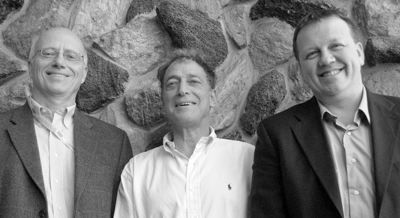United States and Israel support foundation that facilitates business collaborations
By MORDECAI SPECKTOR
It’s kind of like the song “Matchmaker” from Fiddler, only the BIRD Foundation is not in the business of romance, but rather the business of matchmaking services between Israeli and American companies in the realm of research and development.
Ron Maron, Ph.D., director of business development for the BIRD Foundation — the acronym stands for Israeli-U.S. Binational Industrial Research and Development — recently visited the Jewish World offices to discuss his work. Also in the meeting were David Dikken, president and CEO of MTL Corp., and Brian H. Davis, president of the American-Israel Chamber of Commerce of Minnesota.
Maron explained that the U.S. and Israeli governments created the BIRD Foundation in 1977, with initial funding of $150 million.
“We mitigate the risks of U.S. companies collaborating with Israeli companies,” Maron said.
 Ron Maron (center), director of business development for the BIRD Foundation, recently visited the AJW offices with Brian Davis (left), president of the American-Israel Chamber of Commerce of Minnesota; and David Dikken, president of MTL Corp. in Bloomington. (Photo: Mordecai Specktor)
Ron Maron (center), director of business development for the BIRD Foundation, recently visited the AJW offices with Brian Davis (left), president of the American-Israel Chamber of Commerce of Minnesota; and David Dikken, president of MTL Corp. in Bloomington. (Photo: Mordecai Specktor)
The foundation sometimes helps U.S. and Israel companies find each other; and then guides them through the application process for R&D funds. BIRD can provide 50 percent of R&D expenses, up to $1 million, according to Maron. He added, “We don’t have an upside,” in reference to the fact that, unlike a venture capital outfit, the foundation won’t profit from a product that goes to market or even take a seat on a company’s board.
BIRD hopes to recoup its grants, which have gone to around 850 different projects in various industries, including medical devices, communications, homeland security, and renewable and alternative energy. Both start-ups and large established companies have received grants for projects that have earned some $8 billion in revenue, according to the foundation’s Web site.
One of the notable projects facilitated by the BIRD Foundation is the ReWalk machine, a mechanized external skeleton that promises to enable individuals with debilitating spinal cord injuries to walk again. Maron mentioned that the ReWalk R&D effort brought together Allied Orthotics and Prosthetics, a U.S.-based firm, with Argo Medical Technologies in Haifa, Israel. This “upright walking technology” has received press attention around the world.
Closer to home, David Dikken said that his firm, Measurement Technology Laboratories (MTL) was contacted by Tel Aviv University. His firm builds a high-tech robotic measuring machine that “will revolutionize archeological dating,” according to Dikken.
The MTL technology, which was developed originally to measure air pollution particulates (PM2.5), is reputed to be more accurate and less expensive than carbon dating. Dikken said that pottery shards are re-baked and then his machine precisely measures the rate that water is reabsorbed. This is not your bathroom scale; Dikken said measurements go to .1 microgram, or “1/10,000th of an eyelash.”
The folks at Tel Aviv University introduced Dikken to BIRD, as a way to reduce R&D costs for the new application, “which made [MTL’s participation] a pretty easy decision,” he commented.
Dikken said that he would be traveling to Israel for the first time soon. His company does business with the Minnesota Pollution Control Agency; otherwise, “we don’t have a single local client,” he noted.
Maron said that he was heading for the Mayo Clinic in Rochester; but he couldn’t discuss any projects that are in the early stages there. BIRD has two rounds for proposals each year. Once a proposal is made, someone from BIRD, which is based in Tel Aviv, visits the U.S. company.
(American Jewish World, 5.27.11)









 Ron Maron (center), director of business development for the BIRD Foundation, recently visited the AJW offices with Brian Davis (left), president of the American-Israel Chamber of Commerce of Minnesota; and David Dikken, president of MTL Corp. in Bloomington. (Photo: Mordecai Specktor)
Ron Maron (center), director of business development for the BIRD Foundation, recently visited the AJW offices with Brian Davis (left), president of the American-Israel Chamber of Commerce of Minnesota; and David Dikken, president of MTL Corp. in Bloomington. (Photo: Mordecai Specktor)









